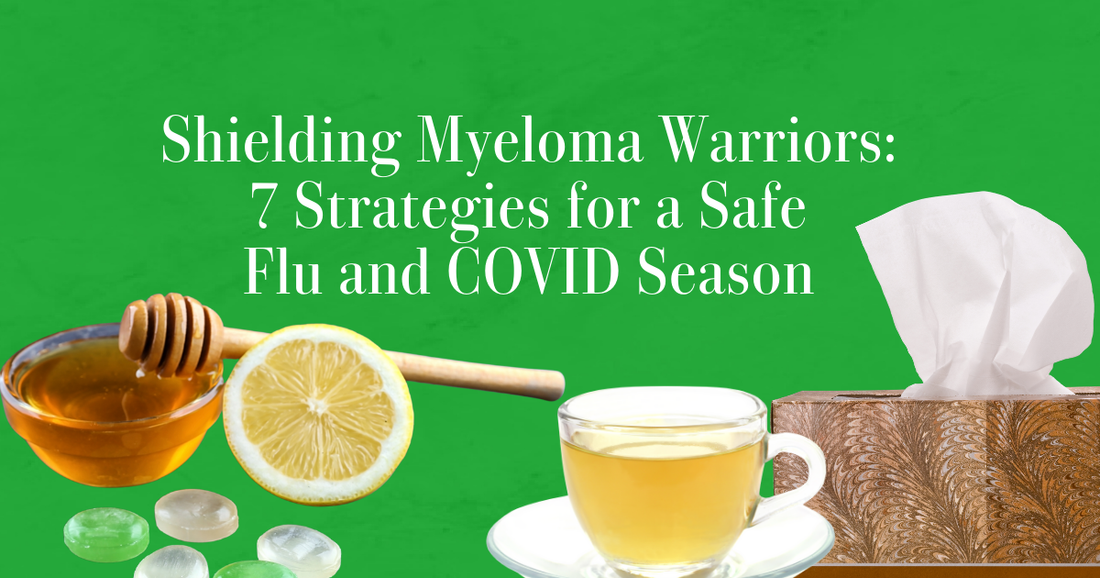
Shielding Myeloma Warriors: 7 Strategies for a Safe Flu and COVID Season
As the flu and Covid season continues to pose a significant threat to our health, it is crucial for individuals with myeloma, a type of blood cancer, to take extra precautions. Myeloma weakens the immune system, making individuals more vulnerable to infections. However, with the proper knowledge and precautions, you can minimize the risk of contracting the flu or Covid-19. Here are seven smart ways to safeguard yourself from myeloma during this season:

Vaccines. Regarding safeguarding a myeloma patient during flu and COVID season, it's vital to chat with your doctor about getting the flu and COVID-19 vaccines and consider a booster shot. Vaccines are crucial in shielding you from these viruses, but it's always best to seek personalized advice from your healthcare provider. By discussing your specific condition with them, you can receive tailored recommendations that will help you stay safe and protected. Don't hesitate to inquire about the significance of booster shots to ensure full protection against the flu and COVID-19. Your health is a top priority, so consult your doctor for the best protection! Stay safe and take care.

Recognize symptoms. Your vigilance is key to their well-being. Be sure to familiarize yourself with the symptoms to watch out for – like fever, cough, sore throat, body aches, and difficulty breathing. Being proactive can make all the difference, empowering you to take control of your health. If you notice any of these signs, don't hesitate to contact your healthcare provider promptly. Remember, early detection means effective management, and that's a game-changer in safeguarding your health. Stay informed, stay vigilant, and keep yourself safe and sound!

Practice good hygiene. Basic hygiene practices can go a long way in preventing the spread of viruses. Wash your hands frequently with soap and water for at least 20 seconds. If soap and water are unavailable, use hand sanitizer containing at least 60% alcohol. Avoid touching your face, especially your eyes, nose, and mouth, as these are entry points for viruses.
Avoid crowds and others who are sick: Myeloma patients should limit their exposure to crowded places, especially during flu and COVID-19 season. Try to maintain a safe distance from people who are ill or showing symptoms of illness, including friends, family, and coworkers. Instead, opt for virtual meetings or gatherings to reduce the risk of infection.
 Be prepared: Prepare a well-stocked medical kit with necessary supplies such as masks, gloves, hand sanitizer, and disinfectant wipes. Ensure you have an adequate supply of medications and other essentials to avoid unnecessary trips to the pharmacy or grocery store, where you may contract the virus.
Be prepared: Prepare a well-stocked medical kit with necessary supplies such as masks, gloves, hand sanitizer, and disinfectant wipes. Ensure you have an adequate supply of medications and other essentials to avoid unnecessary trips to the pharmacy or grocery store, where you may contract the virus.

Pay attention to your breathing: It is crucial to be vigilant about your respiratory health. Difficulty breathing is a common symptom associated with COVID-19; this can be particularly concerning for myeloma patients. A myeloma patient's breathing should monitored. Please remember that it's essential not to overlook any signs of shortness of breath or other respiratory problems, as they could be pretty serious. If you or someone you care about experiences these symptoms, it is crucial to contact your healthcare provider immediately. Seeking prompt medical attention is essential for evaluating the condition and ensuring necessary guidance and treatment. It is worth noting that even seemingly minor symptoms, such as a cough, can lead to complications, such as broken bones in myeloma patients. Taking proactive steps to protect against potential risks is crucial in these challenging times.

Discuss with your care team whether there are precautionary measures you can take to boost your immune system: Myeloma weakens the immune system, making it even more susceptible to infections. It's important to remember that you're not alone in this. Your care team is there to guide you and provide the necessary support. Talk to them about potential measures to strengthen your immune system. This might include dietary changes, exercise, or specific supplements. Your healthcare provider can provide personalized guidance based on your unique situation.
In conclusion, individuals with myeloma must take extra precautions during flu and Covid-19 season. By speaking to your doctor about vaccines, knowing the symptoms to watch out for, practicing good hygiene, avoiding crowds, being prepared, monitoring your breathing, and discussing immune-boosting measures with your care team, you can better protect yourself from these illnesses. Stay connected with loved ones virtually to maintain social connections even when physical presence is impossible. Remember, knowledge and proactive measures are your best defense against these viruses, and the support of your loved ones, even if it's through a screen, is a crucial part of your wellness journey.

